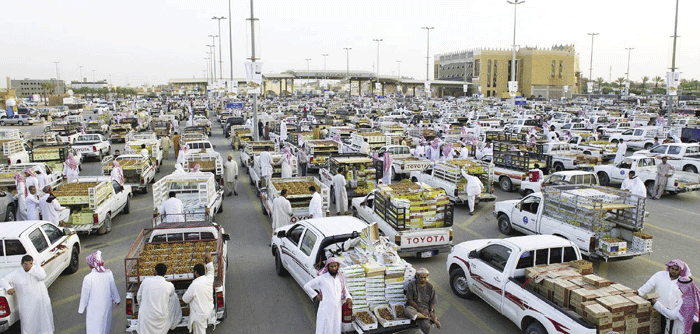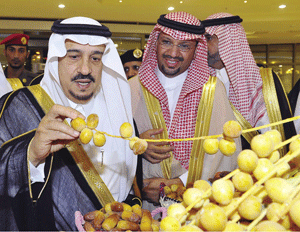
Buraidah Dates Festival
A FIESTA SO SWEET
 |
Every summer, year after year,
Saudi Arabia’s Central Province springs to life with a joyful event
never seen anywhere else in the world. It’s the Buraidah Dates
Festival – a festival, reputed to be
the biggest of its kind in the world… and literally so sweet.
By: VINOD MENON
PhotographS by SPA
Sukhari, Kalas, Hashishi, Aseela, Rothana… may all
sound Greek to many. But for the date farmers at the just-concluded
Buraidah Dates Festival they are some of the varieties of dates they
thrive on. There are some 40 different classy varieties of dates,
with the Sukhari variety accounting for much of the produce in Saudi
Arabia. The three month Buraidah Dates Festival offered a remarkable
experience for the thousands of visitors and traders, who came to
sell, buy or simply watch. The Sukhari and Kalas selections are hot
favorites among the local populace and formed the bulk of the
estimated 300,000 tons of dates sold during the festival. Dates have
been a staple food in Saudi Arabia and other parts of the Middle
East for thousands of years. They are believed to have originated
around the Gulf region.
Arabs introduced dates around northern Africa and into Spain. Today,
an image of a date palm tree forms part of the national emblem of
Saudi Arabia. The Buraidah Dates Festival brings out this very
essence of the fruit’s historical origins. The open air market
remains unchanged in many ways from what date markets were decades
ago.
Traditional sellers shout out their wares and display their
varieties in well defined heaps. Rows and rows of well-stacked
pick-ups line up, doubling as make-shift sales outlets.
 The significance of the festival can be gauged from the
fact that it was inaugurated by no less a person than Prince Faisal bin
Bandar, Governor of Qassim Province of which Buraidah is the capital.
The prince fittingly referred to the festival as an important platform
for marketing the dates not only in Saudi Arabia, but all over the
world.
The significance of the festival can be gauged from the
fact that it was inaugurated by no less a person than Prince Faisal bin
Bandar, Governor of Qassim Province of which Buraidah is the capital.
The prince fittingly referred to the festival as an important platform
for marketing the dates not only in Saudi Arabia, but all over the
world.
Quality dates in labeled cartons seen at the festival are often destined
for foreign markets. As an illustration of the price these cartons
fetched this year, a three-kg box of Sukhari dates went at prices
ranging from SR 55 and SR 130.
There’s more to the festival than just dates. Competitions are held for
the Best Farm, Best Service to the Dates Industry, and Best Scientific
Study on Dates – all toughly fought contests, with the winners
personally awarded by the governor.
With Saudi Arabia being a world leader in date production, there is
little wonder that the fruit is given such an exalted position in the
country. Not only does it hold tremendous economic value to the country,
but also bears religious significance. Dates and date palms find mention
in the Holy Quran several times. Breaking the fast during the holy month
of Ramadan is often done ceremoniously with dates and water.
Moreover, dates spin out a variety of delicacies, the most famous of
them being Mamoul, a kind of cookies filled with date paste. Then there
are chocolates, plain biscuits and even pickles. But a word of caution
for those on a sugar-free diet: The sugar content in dates is high, real
high.
Buraidah’s fertile soil makes it ideally suited for agriculture, which
remains the mainstay of the region’s economy. In support of the fruit
that matters so much to Saudi Arabia, the Qassim Province is putting in
its best to help produce and market the product in the country as well
as in export markets. Research is being constantly conducted to increase
yield and reduce farming losses by creating new methods to eliminate
pests, including the dreaded red palm weevil beetle.
Scores of vehicles, estimated to be more than 2,000 a day, drove into
Buraidah everyday during the festival. Sales are projected to have
crossed the SR one billion mark, making the event a boon to farmers,
traders and consumers – and of course, to the lay visitor for the unique
experience.
Buraidah is just about four hours’ drive from Riyadh, and is well
connected by air to all international airports in Saudi Arabia. It’s
worth a visit.